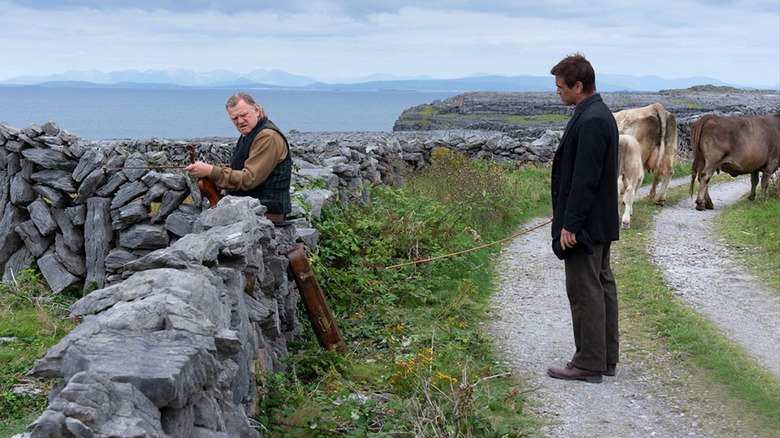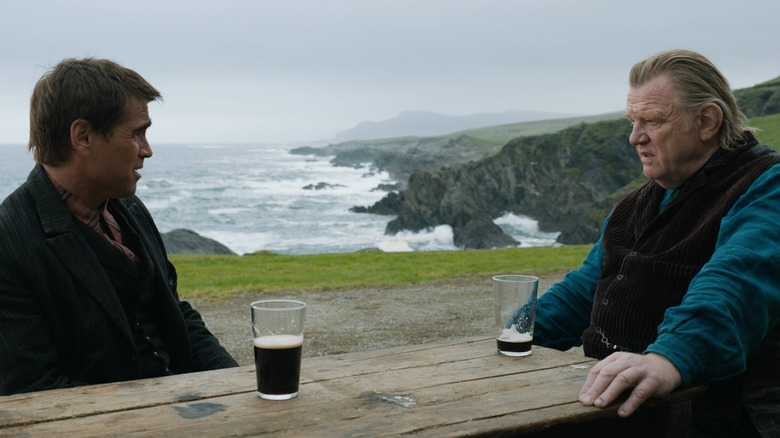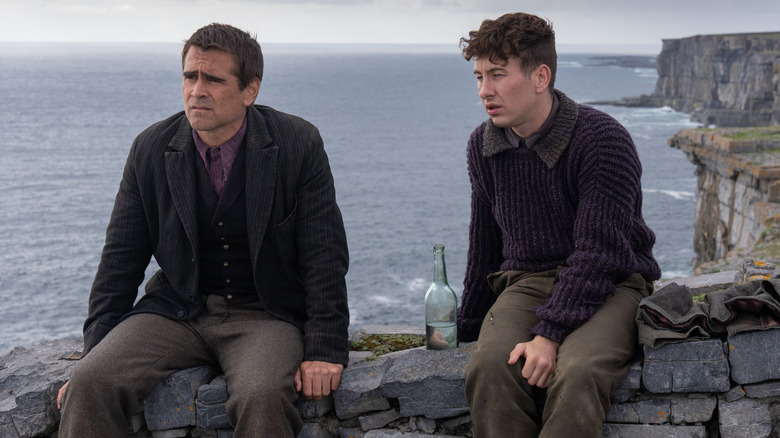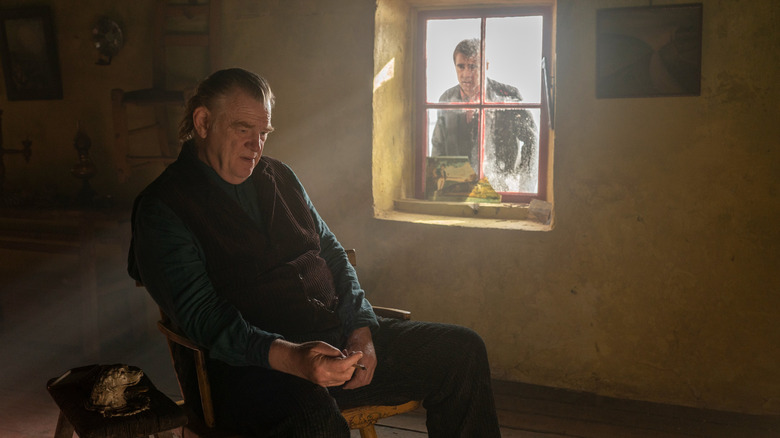The Banshees Of Inisherin Review: Martin McDonagh's Best Film Is Wordsmithing At Its Wisest [Venice]
"I just don't like you anymore," says Brendan Gleeson's world-weary Colm at the start of "The Banshees of Inisherin." It's the first shot in a cold war between an aging Irishman entering his twilight years and Colin Farrell's Pádraic, his one-time chum. But the temperature rises in their tensions as Colm's suggestion that Pádraic is "dull" lodges so firmly in the latter's head that it begins to dictate his actions.
On the one hand, this pithy flare-up concocted by writer/director Martin McDonagh is the perfect distillation of fickle folks in a small town whose favor can shift like the wind. But it's also the Irish nation in microcosm during its setting of spring 1923 as a civil war raged, dividing neighbors and friends over matters of preference. Unlike the hollow thematic chest-thumping of the filmmaker's last work, "Three Billboards Outside Ebbing, Missouri," McDonagh investigates existential divides through the deconstruction of dialogue itself. His uncommonly reflective work is wise wordsmithing wielded by a master of the form, and it lands with walloping force.
When words fail
Only someone so gifted at understanding language could so naturally explore a story that is, at its core, about communication failing. Colm's choice to consciously uncouple from his friend does not arise from active antipathy. Rather, the character comes to understand the true value and currency of words when realizing how relatively few he has left to speak in his life. "I have a tremendous sense of time slipping away," he offers in explanation to an incredulous Pádraic. Colm simply has no patience left for the type of empty conversation he so frequently shares with his mate out of pure convenience.
Colm's turn towards types of communication he views as more eternal – namely, the music he composes and performs through his fiddle – is not meant to be rude. After Pádraic takes a beating in the town square of their little island off the Irish coast, Colm still helps him to his carriage. He just does so in silence. And he's still in the Inisherin spirit of being bluntly honest with his words; he's just no longer generous with doling them out.
Without Colm as his verbal sparring partner, Pádraic is set adrift to reach his friend's point of enlightenment ... but from a place of darkness. He discovers how small talk is just that: tiny, trite, and a mechanism to avoid the dark realization of our own mortality. This sheds newfound light on the other relationships with which Pádraic is left: his sister and housemate Siobhán (Kerry Condon) and the town simpleton Dominic (Barry Keoghan), neither of whom he can quite seem to shake. He begins to wonder if they also just tolerate his talking out of sheer habit – or if this is all the company he can really find in Inisherin.
Career-best turns all around
McDonagh toggles smoothly between two distinct modes in "The Banshees of Inisherin." There are the zesty zingers on par with his quippy "In Bruges," but as the film proceeds, a creeping sense of silent isolation settles over the film's quartet of islanders trying to find contentment. Each casts the other in stark relief, revealing fully-formed characters grappling with the complexities of their countrymen. These are more than just cardboard cutouts in an allegory for the civil war that they flippantly deem a "mainland" issue.
The film soars on the nuances of anguish conveyed by Colin Farrell's Pádraic, whose disillusioned spiral captures the humor and heartbreak of the film in equal measure. As a bloke who's built his sense of self around saying what he means, it's a riveting journey to watch him grapple with whether or not he says anything of meaning at all. Farrell proves as blistering with a barbed remark as a brooding glance. It's a showcase of his versatility like never before seen from the gifted Irish actor who's been something of a muse for McDonagh.
Pádraic finds a fitting foil in the fool Dominic, played with open-hearted abandon by Barry Keoghan. He's a good-natured young man yet also the clearest demonstration of the perils of verbalizing every thought. Dominic has no filter between his mind and his mouth, which places him in alternately comedic and tragic situations. Keoghan's keen understanding of a simple character captures the sweetness of his intentions underneath the stumbling nature of his delivery. At the end of the day, here is someone willing to glom onto the smallest morsels of human kindness he can receive. And the longer "The Banshees of Inisherin" continues, the harder those are to come by.
Gleeson's stoic commitment to Colm's disengagement with Pádraic is necessary to sell some of the more drastic escalations in his vow of silence. As their cold war takes a turn for the uncivil, Gleeson's tethering to his character's sense of nobility — however misplaced it might be — means he can never be entirely dismissed. That sense of dignity is matched in Kerry Condon's Siobhán, a self-appointed mediator who resists reduction to just a simplistic female voice of reason figure.
McDonagh's masterwork
Within "The Banshees of Inisherin," McDonagh manages to capture both the elemental resonance of folklore with the sophisticated weightiness of classic stage drama. This tragicomic tale nimbly balances both the personal and political dimensions of his richly developed characters and scenarios. His dialogue sings with the specificities of characters lashing out against their current circumstances but inevitably shines a light on larger conflicts. No one could dare lob the accusations of dullness in language or intellect against McDonagh that Colm makes of Pádraic.
"I do worry I'm just entertaining myself as I stave off the inevitable," Colm ponders aloud to Siobhán in a moment of vulnerability. Through the introspection and ingenuity of his writing, McDonagh provides high-class entertainment with "The Banshees of Inisherin" that embraces the inevitability of human discord thanks to intractable wills. But the film is not the pitiless task Colm describes. By providing the opportunity to pause, ponder, and parse the delicately selected words he presents, McDonagh snatches language back from the realm of mere placeholding ornamentation. In this potent parable, he imbues words with their full power and potential to give expression to the deepest of human emotions and experiences.
/Film rating: 9.5 out of 10



